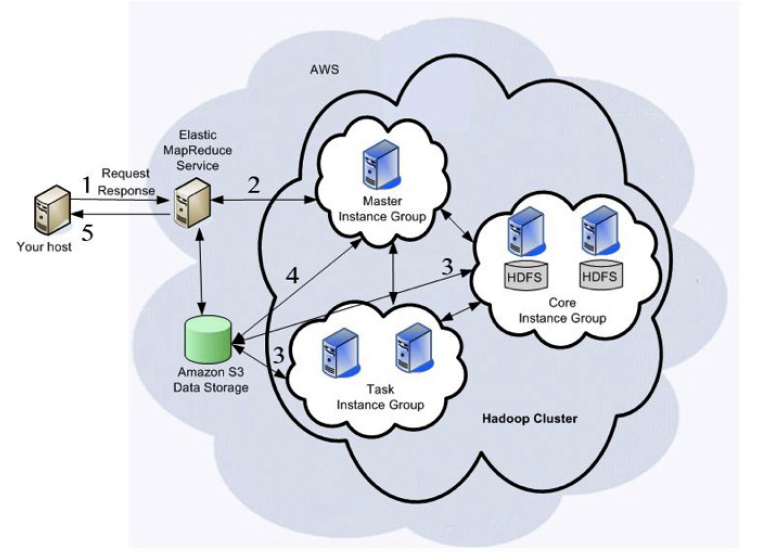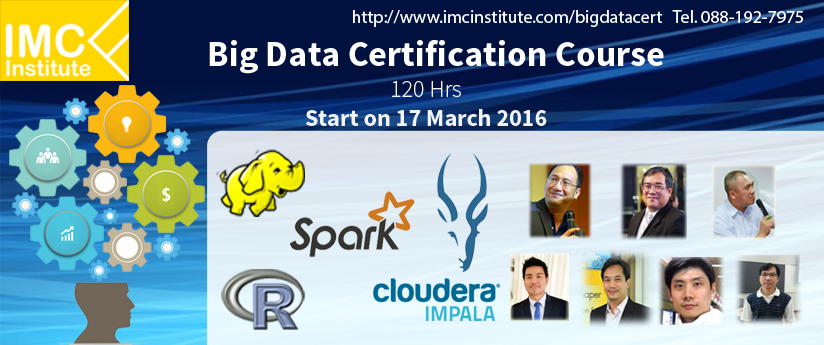Big Data Certification Course
คำอธิบายรายวิชา
Big Data เป็นเทคโนโลยีที่กำลังกล่าวถึงกันอย่างมาก การที่ข้อมูลมีจำนวนมากขึ้นมหาศาล มีหลายรูปแบบ และการมีข้อมูลที่เพิ่มขึ้นอย่างรวดเร็ว ทำให้องค์กรต่างๆต้องปรับโครงสร้างพื้นฐานด้านข้อมูล (Information Infrastructure) มีการนำเทคโนโลยีใหม่เช่น Hadoop, NoSQL หรือ NewSQL เข้ามาใช้งาน ต้องมีการพัฒนาบุคลากรเพื่อให้เข้าใจการใช้เทคโนโลยีเหล่านี้ รวมถึงมีความรู้ในการวิเคราะห์ข้อมูลต่างๆ หลักสูตร Big Data Certification เป็นหลักสูตร 120 ชั่วโมงที่ต้องการพัฒนาให้ผู้เรียนได้เข้าใจถึงเรื่องของ Big Data มีความสามารถในการใช้เครื่องมือต่างๆ เข้าใจในเรื่องของ Business Intelligence และ Data Science ตลอดจนเรื่องรู้การทำ Big Data ตั้งแต่วางกลยุทธ์ จนถึงการทำ Predictive Analytics การสอนในหลักสูตรนี้ประกอบไปด้วยการบรรยาย การทำ Workshop โดยจะมีการติดตั้งใช้เครื่องมือ Big Data จริงๆที่สามารถทำงานได้ รวมถึงการใช้งานบนระบบ Cloud
จากหลักสูตรที่จัดไปช่วงกลางปี มีผู้สนใจ Big Data Certification Course และต้องการให้เปิดเพิ่ม ทางสถาบัน ไอเอ็มซี จึงได้รวบรวมวิทยากร และปรับเนื้อหาให้สอดคล้องกับ เทคโนโลยีที่มีเข้ามาเพิ่มเรื่อยๆ ในหลากหลายมุมของการนำ Big Data ไปใช้ เป็นหลักสูตร 4 เดือน
ระยะเวลาอบรม : 120 ชั่วโมง
-
เรียนทุกวันพฤหัสบดีตอนเย็น 18.00 -21.00 น. และวันเสาร์ 9.00 - 17.00 น.
กำหนดการอบรม
-
Module 1: Big Data Essentials and NoSQL: วันที่ 17, 19, 24, 26, 31 มีนาคม 2 เมษายน
-
Module 2: Big Data Using Hadoop: วันที่ 7, 9, 21, 23 , 28, 30 เมษายน
-
Module 3: Business Intelligence Design&Process :วันที่ 12, 14, 19, 28 พฤษภาคม 2, 4 มิถุนายน
-
Module 4: Data Scientist Essentials: วันที่ 9, 11, 16, 18, 23, 25 มิถุนายน
ค่าอบรม : 59,000 บาท ไม่รวม VAT
(ค่าอบรมรวม ค่าเอกสารอบรม ค่าใช้งาน AWS Cloud ค่าอาหารกลางวัน อาหารว่าง และ อาหารเย็นวันพฤหัสบดี)
วัตถุประสงค์ของการอบรม
หลักสูตรการอบรม120 ชั่วโมงนี้ มีวัตถุประสงค์เพื่อให้ผู้เข้าอบรมได้รับความรู้ด้านต่างๆดังนี้
-
เข้าใจหลักการของ Big Data และแนวโน้มของเทคโนโลยีด้านข้อมูล
-
สามารถวางแผนการออกแบบ Big Data Infrastructure ในองค์กร
-
เรียนรู้การใช้งานเทคโนโลยี NoSQL อาทิเช่น Cassandra หรือ MongoDB
-
เรียนรู้การใช้งานเทคโนโลยี Hadoop และเทคโนโลยีที่เกี่ยวข้องอาทิเช่น Hive, Pig, Sqoop, Flume หรือ HBase
-
สามารถเขียนโปรแกรมวิเคราะห์ข้อมูล unstructure โดยใช้โปรแกรม MapReduce, Hive หรือ Pig ได้
-
เรียบนรู้การใช้ Spark, SparkSQL
-
เข้าใจหลักการการออกแบบและวิเคราะห์ข้อมูลที่เป็น Business Intelliegence
-
เข้าใจการใช้งาน Dataware House และการทำ Data Mining
-
เรียนรู้หลักการของ Data Scientist และอัลกอริทึมในการพยากรณ์ข้อมูลจต่างๆทั้งแบบที่เป็น Recommendation, Clustering และ Classification
วิทยากร:
-
Assoc. Prof. Dr. Thanachart Numnonda (See Profile >> Here)
-
Asst.Prof. Dr.Putchong Uthayopas, Assistant, Kasetsart University
-
Assoc.Prof. Dr.Jirapun Daengdej, Dean Faculty of Science, ABAC.
-
Mr. Chinnavit Chalidabhongse (See Profile >> Here)
-
Mr. Danairat Thanabodithammachari (See Profile >> Here)
-
Mr. Dendej Sawarnkatat (See Profile >> Here)
-
Mr. Komes Chandavimol (See Profile >> Here)
สถานที่อบรม: The Connecion (Near MRT Ladprao Exit 4)>> See Map
รูปแบบการอบรม:
-
การบรรยาย 30% ปฎิบัติการ 70%
-
การบรรยายภาคทฤษฎี
-
การจัดกลุ่มอภิปรายกรณีศึกษาขอการทำ Big Data Strategy
-
การทำ Hand-on Lab ติดตั้งระบบจริง และการใช้ Big Data as a Service
-
การพัฒนาโปรแกรมต่างๆ
-
การทำ Mini-Project
-
การทำแบบทดสอบ
-
การดูงานและเข้าร่วมฟังการบรรยายในต่างประเทศ
บุคลากรที่ควรเข้าร่วมการอบรม
บุคคลทั่วไปที่สนใจจะพัฒนา Big Data และต้องการเป็น Big Data IT Professional หรือ Data Scientist โดยต้องมีความรู้พื้นฐานด้านไอทีมาเป็นอย่างดี มีความรู้เรื่องฐานข้อมูล และการเขียนโปรแกรมมาบ้าง
คุณสมบัติเบื้องต้นของผู้เข้าร่วมการอบรม
-
ต้องมีประสบการณ์การทำงานด้านไอทีมาอย่างน้อยสองปี
-
ควรมีความรู้พื้นฐานเรื่องระบบฐานข้อมูล
-
มีพื้นฐานด้านการพัฒนาโปรแกรมภาษาใดภาษาหนึ่ง
สิ่งที่จะได้จากการอบรม:
-
จะทำให้เข้าใจหลักการของ Big Data การวางกลยุทธ์ด้าน Big Data
-
เข้าใจเทคโนโลยีต่างๆของ Big Data
-
เรียนรู้การทำ Big Data Life Cycle และการบริหารโครงการ Big Data
-
การใช้เครื่องมือต่างๆที่เกี่ยวข้องกับ Big Data เช่น NoSQL, Hadoop, BI Tools และ Machine Learning Tool
-
สามารถที่จะติดตั้ง Hadoop Cluster เพื่อนำมาใช้ในองค์กร
-
สามารถติดตั้ง Hadoop Cluster อย่าง Cloudera, Hortonworks, Azure HDInsight
-
เรียนรู้การใช้ Big Data as a Service บน Cloud Platform
-
สามารถที่จะพัฒนาโปรแกรมวิเคราะห์ Big Data ได้โดยใช้ Spark, MapReduce, Hive, Pig, Microsoft SQL, R หรือ MLib
-
เรียนรู้การทำ Business Intelligence โดยใช้ SQL Server
-
สามารถใช้ BI Tools อย่าง Tableau ได้
-
เรียนรู้ด้าน Data Science เบื้องต้น ความหมายของ Machine Learning และการทำ Predictive Analytics
-
รู้การใช้ Machine Learning Tool อย่าง Azure Machine Learning
ระบบ Computer Cluster ที่จะใช้ในการอบรม:
ในการอบรมนี้จะมีการติดตั้งระบบ Big Data Cluster ที่สามารถรองรับข้อมูลขนาดใหญ่ ที่สามารถใช้งานได้จริง โดยจะใช้ Server ของ Amazon Web Services ให้ผู้เรียนได้ติดตั้ง Hadoop Cluster โดยใช้ Server EC2 จำนวนหลายเครื่อง และจะมี Hadoop Cluster ที่เป็น Amazon EMR (Elastic Map Reduce) ที่สามารถรองรับข้อมูลขนาดใหญ่จำนวนเป็น GByte เพิ่อให้ผู้เข้าอบรมได้เรียนรู้การทำงานจริงๆ

เทคโนโลยีที่จะใช้ในการอบรม
-
เทคโนโลยีด้าน Big Data
-
Hadoop Cluster using Apache, and Cloudera Distribution
-
Hadoop Cluster on Microsoft Azure, Amazon EMR
-
Cassandra NoSQL
-
Mongo NoSQL
-
Microsoft SQL Server
-
Tableau
-
ภาษาที่จะใช้ในการประมวลผลข้อมูล
-
Spark
-
Map/Reduce using Java
-
Hive, Pig
-
Spark SQL
-
R Programming
-
MLib
-
เทคโนโลยีด้าน Cloud Computing
-
Microsoft Azure
-
Amazon Web Services using EC2, S3 and EMR
ตัวอย่างเอกสารที่จะใช้ในการอบรม
เนื้อหาในการอบรม:
Module 1: Big Data Essentials and NoSQL
-
Introduction to Big Data (Dr.Thanachart, Dr.Putchong, Dr.Jirapun)
-
Big Data Definition
-
Why Big Data?
-
Big Data Eco-System
-
Big Data Benefits
-
Big Data vs. Business Intelligent vs. Analytics
-
Big Data Use Cases
-
Big Data Technology
-
Big Data Planning (Dr.Thanachart, Aj. Danairat)
-
Big Data Strategy
-
How to Start and Structure Team to Support Big Data in Your Organization
-
Big Data Project Management
-
Big Data Matuarity Model
-
Big Data Governance
-
Introduction to NoSQL (Aj.Dendej)
-
What is NoSQL?
-
Introduction to MongoDB
-
The Mongo Shell
-
MongoDB Lab
-
Introduction to Casdrandra NoSQL
-
Understanding Cassandra Data Model
-
Creating Sample Application Using Cassandra
-
Mini-Project Planning (Dr.Thanachart)
Module 2: Big Data Using Hadoop:
-
Introduction to Hadoop (Dr.Thanachart)
-
What is Hadoop?
-
Hadoop Architecture and HDFS
-
Comparison of Hadoop Software Distribution Products
-
Comparison of Hardware for Hadoop Ecosystem
-
Hadoop on Cloud: Hadoop as a Service
-
Hadoop Setup (Dr.Thanachart, Aj.Danairat)
-
Installing Hadoop on a local machine
-
Set up Hadoop Cluster (This Lab will be done on AWS)
-
Hadoop MapReduce Framework (Aj.Danairat)
-
MapReduce Architecture
-
Anatomy of MapReduce Program
-
Demo on MapReduce.
-
Map Reduce Custom Libraries
-
Hive, Pig (Dr.Thanachart)
-
Programming Structure in Pig
-
Pig components,
-
Pig Latin Program,
-
Data Models in Pig,
-
Pig Data Types.
-
Hive QL: Joining Tables,
-
Dynamic Partitioning,
-
Custom Map/Reduce Scripts, Hive
-
Hadoop Dustribution Setup using Cloudera (Dr.Thanachart)
-
Introduction to Spark (Dr.Thanachart)
-
Installing Spark
-
Spark Deconstructed
-
Your first application
-
RDD
-
Spark SQL
-
Other Hadoop Components ( Dr.Thanachart)
-
HBase, HBase v/s RDBMS, HBase Components, HBase Architecture
-
Flume
-
Sqoop
-
Oozie, Oozie Components, Oozie Workflow,
-
Hadoop Big Data Mini-Project
Module 3: Business Intelligence Design&Process:
-
Introduction to BI (Aj.Chinnavit)
-
BI Development process
-
Requirement analysis
-
Data warehouse dimensional design
-
Dimensions and measures
-
Slowly changing dimensions
-
Enterprise data warehouse
-
Master data management
-
Data Integration (Aj.Chinnavit)
-
Data integration process
-
Working with ETL
-
Data flow and control flow
-
Checkpoint, logging, error handling
-
OLAP (Aj.Chinnavit)
-
OLAP structure and design
-
Populating OLAP
-
Hierarchical dimension
-
Calculated measure, MDX
-
KPI, scorecard measure
-
Pivoting with OLAP
-
Data Analytics (Aj.Chinnavit)
-
Data exploration, analytics and visualization
-
Ad-hoc analysis
-
In-memory analytics
-
Data visualization design and selection criteria
-
Introduction to Tableau Desktop and Tableau Public (A.Komes)
o Connect To the Data using Tableau
o Data Source, Metadata, Data Connection
o Join Type and Data Blending
o Working with the Marks Card, Outliers, Filtering and Groups
o Drill-Down, Hierarchy , Sorting and Grouping
-
Hands-On: Business Cases - Build with varieties of graphs and charts
-
Tableau Calculations and Parameters (A.Komes)
o Table Calculations and Parameters
o Row-level Calculations
o Blending and Aggregation-level Calculations
Hands-On: Build interactive graphs and charts
-
Understand the Dashboard Concepts and Designs (A.Komes)
-
Dashboard and Stories
-
Dashboard best Practice
-
Dashboard Layout, Formatting, Actions
Module 4: Data Scientist Essentials
-
Introduction to Data Science(Dr.Jirapun)
-
Big Data using Hadoop and R
-
Methodologies used for analysis
-
the Architecture and Methodologies
-
Application of Machine Learning Techniques
-
Machine Learning Techniques (Dr.Jirapun)
-
Machine Learning Overview
-
Machine Learning Use Cases
-
Understanding Supervised and Unsupervised Learning Techniques
-
Creating predictive models
-
Introduction to R (Aj.Dendej)
-
Data manipulation techniques using R
-
Machine Learning using R
-
Integrating R with Hadoop
-
Parallel Processing using R
-
Introduction to RSpark (Aj.Dendej & Dr.Thanachart)
-
Introduction to MLib
-
Using RSpark for Data Scientis
-
Introduction to Azure Machine Learning ( Dr.Thanachart)
-
Azure Machine Learning Setup
-
Recommendations using Azure
-
Clustering, Common Clustering Algorithms using Azure















